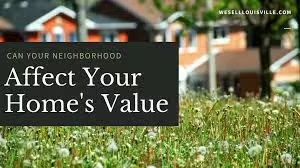The old adage in real estate, “location, location, location,” underscores the critical importance of a property’s neighborhood in determining its value. Beyond the physical structure and features of a home, the neighborhood in which it resides plays a significant role in shaping its market worth. Understanding how different neighborhood factors influence property values can provide valuable insights for homeowners, buyers, sellers, and investors alike. This article delves into the multifaceted ways in which a neighborhood impacts property value, exploring various factors and their implications.
The Importance of Neighborhood in Property Valuation
When assessing the value of a property, real estate Agents Shirley and appraisers consistently emphasize the pivotal role of its neighborhood. The neighborhood serves as the context within which the property exists, influencing perceptions of desirability, quality of life, and future investment potential. Here are key factors that contribute to a neighborhood’s impact on property values:
1. Location and Accessibility
The geographic location of a neighborhood relative to city centers, employment hubs, schools, and transportation networks significantly affects property values. Urban neighborhoods close to amenities like shops, restaurants, public transit, and major highways tend to command higher prices due to convenience and accessibility. Properties located in suburban or rural areas may offer larger lots and quieter surroundings but might be valued less if they lack proximity to urban conveniences.
2. School District Quality
The quality of local schools exerts a profound influence on property values. Families with children often prioritize neighborhoods with highly-rated schools, willing to pay a premium to secure access to quality education. Homes located within the boundaries of sought-after school districts typically experience higher demand and, consequently, higher property values. Conversely, neighborhoods with underperforming schools may struggle to attract buyers, resulting in lower property values.
3. Neighborhood Safety and Crime Rates
Safety is a fundamental concern for homeowners and prospective buyers. Neighborhoods with low crime rates and a reputation for safety tend to be more attractive to families, professionals, and retirees alike. Properties in safe neighborhoods often enjoy higher demand and appreciation in value over time. Conversely, high crime rates or perceptions of insecurity can deter potential buyers and suppress property values in affected areas.
4. Community Amenities and Services
The availability of parks, recreational facilities, libraries, community centers, and healthcare services contributes to the overall quality of life in a neighborhood. Access to well-maintained amenities enhances the attractiveness of a neighborhood and can positively impact property values. Neighborhoods with robust community services and recreational opportunities tend to foster a stronger sense of community and pride among residents, further bolstering property values.
5. Property Taxes and Local Government Services
Property taxes and the quality of local government services, such as infrastructure maintenance, garbage collection, and public utilities, also influence property values. Homeowners expect adequate services in exchange for their tax dollars and may be willing to pay more for properties in neighborhoods with efficient local governance and well-maintained public amenities. Conversely, neighborhoods with high tax rates or inadequate services may experience downward pressure on property values.
6. Demographic Trends and Cultural Factors
Changes in demographic trends, such as population growth, age distribution, and cultural diversity, can impact neighborhood dynamics and property values. Neighborhoods experiencing influxes of younger families, millennials, or retirees may see increased demand for housing, driving up property values. Similarly, neighborhoods with vibrant cultural scenes, diverse culinary options, and community events often appeal to a broad spectrum of buyers and contribute to higher property values.
7. Economic Stability and Development
The economic health and development prospects of a neighborhood play a critical role in property valuation. Neighborhoods experiencing economic growth, job creation, and new infrastructure projects often see rising property values as demand for housing increases. Conversely, economic decline, high unemployment rates, or stagnant development may lead to stagnation or depreciation in property values.
Recommended: Get a legal loan Singapore from the best licensed moneylenders Singapore
Analyzing Neighborhood Data and Trends
To effectively assess how a neighborhood influences property values, stakeholders can leverage data-driven analysis and market trends:
- Comparative Market Analysis (CMA): Real estate professionals use CMAs to compare recent sales of similar properties within a neighborhood, adjusting for differences in size, condition, and amenities to estimate a property’s market value.
- Local Market Conditions: Monitoring local market trends, such as median home prices, days on market, and inventory levels, provides insights into supply and demand dynamics within a neighborhood.
- Neighborhood Appreciation Rates: Tracking historical property appreciation rates and forecasting future trends can help homeowners and investors make informed decisions about buying, selling, or investing in a particular neighborhood.
Challenges and Considerations in Neighborhood Valuation
While neighborhood factors strongly influence property values, several challenges and considerations should be acknowledged:
- Subjectivity and Perception: Perceptions of a neighborhood’s desirability can vary among individuals and change over time, impacting property values.
- External Factors: Economic recessions, natural disasters, or shifts in local policy can unpredictably affect neighborhood dynamics and property values.
- Gentrification and Displacement: Gentrification processes can lead to rising property values but may also displace long-term residents and alter neighborhood character.
Conclusion: Harnessing the Power of Neighborhood Factors
In conclusion, the neighborhood in which a property is located profoundly shapes its market value and investment potential. Factors such as location, school quality, safety, amenities, and economic stability all contribute to perceptions of desirability and, consequently, property values. By understanding these neighborhood dynamics and conducting thorough due diligence, homeowners, buyers, sellers, and investors can make informed decisions that align with their financial goals and lifestyle preferences. As the real estate market evolves, harnessing the power of neighborhood factors remains integral to navigating the complexities of property valuation and maximizing investment returns.
Recommended: Get a payday loan Singapore from a licensed money lender Singapore.



